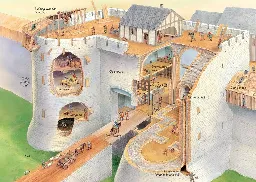Challenge in the Mist - Graham Turner
Dawn on the 14th April 1471, and Richard Duke of Gloucester and his men strain to pick out the Lancastrian army through the thick mist that envelopes the battlefield at Barnet.
At dawn on Easter Sunday, the armies of Edward IV and his one time ally, Richard Neville, Earl of Warwick, confronted each other near Barnet, 10 miles outside London.
A thick fog enveloped the battlefield, causing the opposing forces to misalign - Edward’s right wing overlapping Warwick’s left and visa versa. In the struggle that followed, the Yorkist left was outflanked and crumbled, its remnants being pursued off the field by the Earl of Oxford’s men. However, when Oxford managed to regroup some of his force and return to the fray, the misalignment of the armies had caused the whole battle line to rotate and in the confusion, they found themselves engaged against their allies.
A cry of treason threw the Lancastrians into disarray and in the ensuing rout the Earl of Warwick met his end as he tried to reach his horse.
At Barnet, as at Tewkesbury two weeks later, the Yorkist vanguard was commanded by Edward’s 19 year old brother, Richard, Duke of Gloucester. He was involved in some of the heaviest fighting - being slightly wounded himself - and he would later have several of his retainers remembered in prayers, ‘slayn in his service at the batalles of Bernett, Tekysbery or at any other feldes’.
Graham Turner’s painting shows Richard with his standard bearer as they strain to see the enemy, apprehension mixed with excitement as they anticipate the slaughter that is to come.
“Dude, I think the rose bush is over there. If we can get to it and cut it, the war will finally be over!”
“I think you’re right, it smells fantastic”
“That won’t be so easy though, so many brave men were wounded already because of the thorns. They are very spiky.”
Since you’re not providing context.


